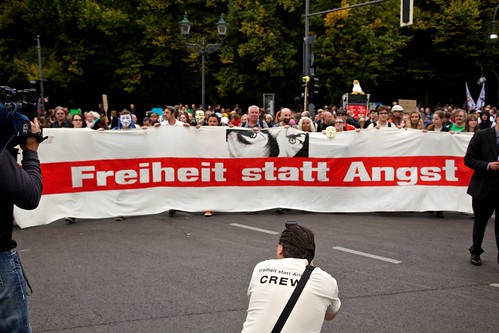16 English Words That Are Actually German (Part 1) Posted by Constanze on Mar 29, 2015 in Language
Guten Tag!
Yes, it’s another Denglish post – but this time with a twist!
We might get slightly irritated with the way the English language is manipulating modern German (and the various ways in which it’s doing it), but before we get too irritated, let’s take a look at how many German words the English language uses! Some are more obvious than others, and some might even surprise you.
I’m splitting this into two parts as there are a lot of words to cover. Here’s part 1.
Zeitgeist
Literal translation & German meaning: Time spirit/the spirit of the times
Meaning in English: The spirit of the times.
Use in a sentence: He really captured the zeitgeist of the 1980s with his music.
Angst
Literal translation & German meaning: Fear
Meaning in English: The anxiety and inner turmoil often associated with a person’s teenage years (‘Teenage angst’)
Use in a sentence: ‘Kanye West says he’s ‘full of angst’ like John Lennon’
Über
Literal translation & German meaning: About, over or above (depending on context)
Meaning in English: Used to mean ‘extra’ or ‘extremely’. It is used in front of another word, for example über-cool.
Use in a sentence: That guy is an uber-geek.
Extra fact: The English version is often used without the Umlaut, so it becomes uber.
Kindergarten
Literal translation & German meaning: Children garden, meaning a pre-school for children.
Meaning in English: A pre-school for children. Similar English words are playgroup and nursery.
Use in a sentence: I’m taking Sarah to kindergarten.
Kitsch
Literal translation & German meaning: Something trashy/gaudy, possibly from the verb kitschen, meaning ‘to smear or scrape together’
Meaning in English: Something tacky, gaudy or tasteless, mainly referring to music, jewellery, art, decor or fashion.
Use in a sentence: Her house is full of kitsch!
Extra fact: The adjective kitschy is used in English in place of the German kitschig.
Strudel
Literal translation & German meaning: Whirlpool (in middle-high German), but refers to a type of pastry dessert.
Meaning in English: A German pastry dessert e.g. Apple strudel.
Use in a sentence: How about some apple strudel tonight?
Dachshund
Literal translation & German meaning: Badger-dog, referring to a breed of dog
Meaning in English: The breed of dog also referred to colloquially as a sausage dog (though the English pronounce it ‘dashund’)
Use in a sentence: I’m taking my dachshund out for a walk
Rucksack
Literal translation & German meaning: Back sack, meaning backpack
Meaning in English: Backpack
Use in a sentence: I need to pack my rucksack for school
Extra fact: This is still used in English, though backpack is more common
Did any of these words surprise you? How often do you use these words, or see them used in English?
Check back soon for part 2!
Bis später,
Constanze x

Build vocabulary, practice pronunciation, and more with Transparent Language Online. Available anytime, anywhere, on any device.
About the Author: Constanze
Servus! I'm Constanze and I live in the UK. I'm half English and half German, and have been writing about German language and culture on this blog since 2014. I am also a fitness instructor & personal trainer.






Comments:
Richard Kimmel:
I like your post very much. But I think most Americans pronounce dachshund more or less correctly. I have never heard anyone say dashund. But then, I am old, a neophyte German student, and think it should be dochshund. OK,not funny. Also, I think some (older)backpackers would define a rucksack as a backpack without a frame, but again, I am not up on current lingo. “Bookbag” and “hydration pack” have never appealed to me mostly because their use is not as restrictive as their titles.But it’s great marketing, “hey, when did you get the new rucksack?” “It’s not a rucksack, it’s a book bag.”
Constanze:
@Richard Kimmel Thanks for the comment, Richard. I should really have clarified that when I talk about English I’m talking about British-English. It may well be different in American-English!
Brian O’Sullivan:
Nice list, Constanze, and timely for me — just two weeks ago I was discussing some “Denglisch” words with a coworker while in Wuppertal. “Rucksack” was on that list; “backpack” is far more common in the US, but I think “rucksack” was more popular at the beginning of the 20th century. I grew up learning to pronounce “Dachshund” similar to the German pronunciation, although in my home city of Baltimore, many “locals” instead say “dash-hound”! A good friend of mine is a psychologist and philosophy teacher; she recently learned “sehnsucht” and has been happy to add that to her vocabulary.
Allan Mahnke:
I am always stunned as I watch Bukow & König or Ballauf & Schenk, how many English words and phrases have crept into German. In a way I’m sorry. But, on the other hand, since my father-in-law was also Freddy Schenk (in his case Friedrich, not Alfred), I always smile. We can’t stop languages from absorbing so-called foreign words (the French notwithstanding.) I can only smile and be amazed.
Allan
amelia:
I never made the connection between the German roots of the word and the way we sloppily pronounce Dachshund sorta like “dox-hen” in English! it all makes so much more sense now!
Gudrun Colbow:
I am German and I like the way words are exchanged in the languages. I am curious about the next eight words.
Constanze:
@Gudrun Colbow Thanks, Gudrun! The next 8 words are up and you can find them here: https://blogs.transparent.com/german/16-english-words-that-are-actually-german-part-2/
Constanze x
heike:
I disagree with your explanation of kitsch.
Kitsch is not trash, you would use the word kitsch to describe decor that has no value or is tasteless for example.
Constanze:
@heike Hi Heike, thanks for your comment! With that, I was going for a literal/etymological translation of Kitsch, rather than its meaning. I have added some more details for clarification. 🙂
Patrick:
Kindergarten, at least where I’m from in the Midwest of America, actually refers to a specific grade of schooling. Pre-school is the first, then Kindergarten, and then you begin “First Grade.” If anything, pre-school is used as the generic term for both of the grades before the numbered grades begin, but generally people refer to pre-school and kindergarten separately.
Constanze:
@Patrick That’s quite interesting, Patrick. I didn’t know it had different meanings in different countries. Then again, English terms like ‘first school’ and ‘high school’ and ‘secondary school’ are different in different places, too, so I guess it only makes sense!
Danke!
Chris:
One I never hear mentioned in these type of posts is the word “Blitz”. In American football it is when the defense rushes(or puts extra pressure) on the quarterback (the guy who gets the ball at the snap). An example would sound like “On third down and long the defense brought extra defenders to blitz the quarterback”.
Constanze:
@Chris That’s a good one, Chris! The word ‘Blitz’ has been adopted into English to mean a variety of things (I’ve never heard of it used like that in American football, for example!). In German it means ‘lightning’. Very interesting. Thanks for your comment.